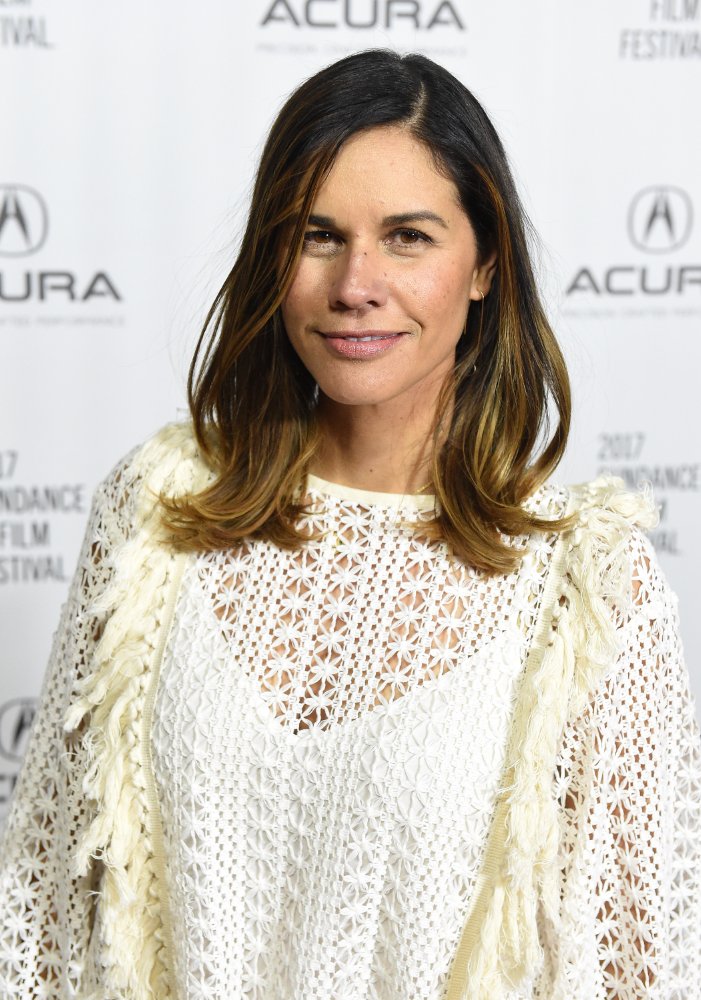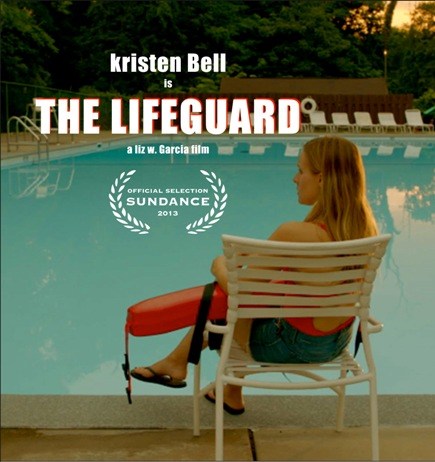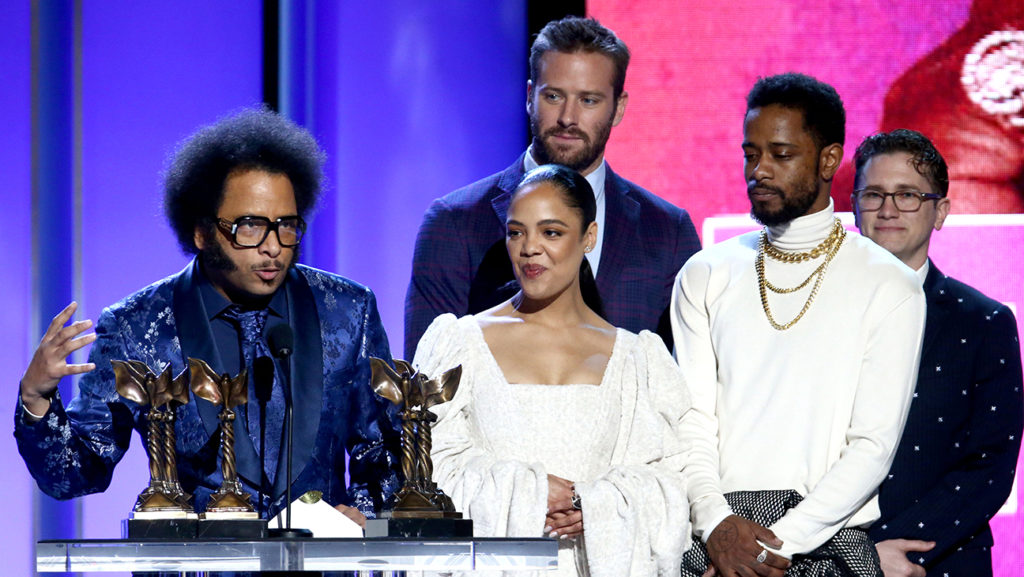Premiering a feature film at Sundance is a rare feat for any filmmaker. Going three-for-three is an even rarer feat, one accomplished by producer NAOMI SCOTT. To date, Scott has produced three feature films, all of which had highly-anticipated bows in Park City: Patrick Brice’s The Overnight in 2015, Chris Kelly’s Other People in 2016, and Scott’s newest effort (directed by Alethea Jones), FUN MOM DINNER. This impressive track record is just one of the reasons Variety named Scott as one of their “10 Producers to Watch.”
In Fun Mom Dinner – arriving in select theaters and On Demand/Digital HD on August 4 – a quiet meal away from the kids turns into a debaucherous night out for Katie Aselton, Toni Collette, Bridget Everett, and Molly Shannon. It marks the feature debut of not only director Jones, but of screenwriter Julie Rudd. The cast is also stacked with supporting parts from Rob Huebel, Adam Levine, Paul Rudd, David Wain, and Adam Scott (Naomi’s husband and her Gettin’ Rad Productions co-founder). Leading up to its Sundance premiere, Momentum Pictures picked up distribution rights, and will now roll out the film this week.
We had a chance to talk with producer Naomi Scott about overseeing an ensemble comedy, her Sundance trifecta, budgeting for an awesome ’80s soundtrack, and more.
——
COLIN McCORMACK: How did you get into producing?
NAOMI SCOTT: I got in by way of television in a very specific arena, which was late night. I started at Jimmy Kimmel Live. I was there for the first year; I was an assistant there and then ended up being a producer on that show. That was my foray into producing.
CM: That was when the show was actually live, right?
NS: We were very live. For a very short period of time, before ABC thought it was a bad idea [laughs]. It was really fun though. We had some great people who had worked on Letterman, including our executive producer and the head writer, so there was a feeling that anything could happen and it had that kind of feel to the show. So even though that piece was short-lived, it was great and we all learned huge lessons in a short amount of time.
CM: What were some lessons from producing live TV that you could bring over to features?
NS: I think you a hundred percent need to depend on quick thinking. Anything can happen on live television, and the same with doing film. Absolutely anything can happen and it usually does happen [laughs]. Whether it’s someone doesn’t show up on time because they had to use their own transportation, or perhaps equipment didn’t show up on time; in every instance, you have to be prepared and not only have a B plan but a C and sometimes a D plan as well. So quick thinking and being flexible; that means having a really great rapport and relationship with the filmmakers so that when plans affect a scene specifically – maybe how it’s going to be blocked or who’s going to shoot – and working with your AD team to make sure you can be flexible with the plan.
CM: When did you and Adam decide to start your own production company?
NS: I had taken a bit of time off when we had our first child, and I was heading back to work when I realized that the hours I was going to be working on someone else’s show were going to be so great that I was going to not see not only my child but also my husband. So we hatched a plan one night – not knowing how we would work together – Why don’t we try to create a production company? Where we would actually interact with one another on the development side as well as maybe production if he was going to star in it. We took the chance and started a company and really came up with our first series idea, which we did for Adult Swim, called The Greatest Event in Television History.
CM: When it came to branching out to features, was the initial thought to specifically look for potential star vehicles for Adam? Or did you always know you’d be expanding beyond that?
NS: We didn’t always know. I think obviously it was an easier move for us because we had an [actor] attachment. We had someone already in the cast. I think features for us felt— the independent film community is generally very welcoming, so we felt we could jump in there a bit easier than we could into television (which we ultimately branched out into as well). But features we were able to figure out and navigate things like financing a little bit easier on an indie than we were to figure out how we would sell a show, for instance. And again, having Adam as an attachment really helped us out on our first feature The Overnight, which was very indie. It was SAG, but it was very indie. [Laughs]
CM: That’s what we do, we promote the very indie SAG-AFTRA contracts.
NS: There was no other way we would have been able to do it. So we’re thrilled with SAG and the opportunities they afford really small, micro-budget productions.
CM: For other projects, did you have screenwriters or filmmakers on your radar that you guys wanted to work with, or were people just submitting things to you? How did you go about finding your projects?
NS: We read a lot. I think part of it too is knowing what’s out there and being open to reading your aunt’s friend’s script, or a friend’s college-bound child’s. Reading anything and everything, and also being open to other things you might not [expect]. Other People was our second feature, and that was a script that was more on the dramedy side, and we weren’t sure. We kind of figured we’d be doing more comedies, and that [script] came through and it touched us so much but also made us laugh that we couldn’t help but do it. Then for Fun Mom Dinner, which is what’s coming out this week, that was incidentally through a friend. A really good friend of ours, Julie Rudd, had an idea for a script. And this was her first, so we were able to work together and she would write in between dropping her kids off in the morning and picking them up in the evening. She’d send in the pages and it was a kind of organic way of working. So that was through a friend and it worked out really well.
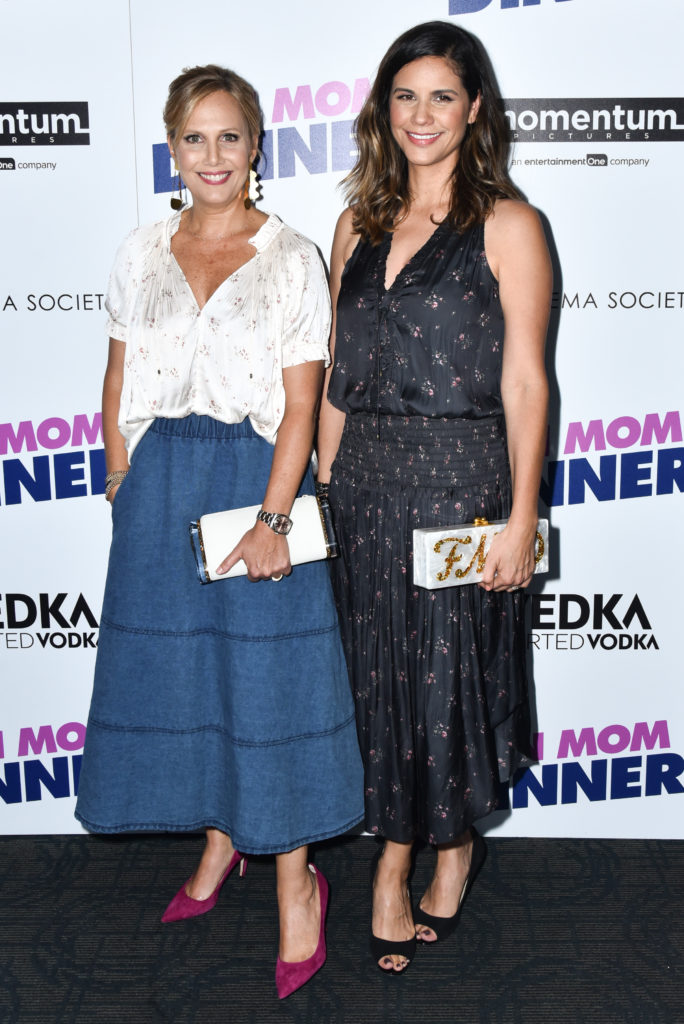
CM: How did you end up attaching Alethea Jones as director of Fun Mom Dinner?
NS: Alethea we met through the traditional general meeting [process]. Actually, her manager had represented Chris Kelly, who we had worked with on our last feature. Julie and I knew we wanted to work with a woman to direct this film. And Alethea was one of several who came into meet, and she immediately understood the material and had a great eye. Her shorts were these award-winning shorts that were so special, we knew that we had found somebody who could elevate Julie’s story and bring it so much groundedness and credibility, but also visually really take it to a place that we hadn’t even imagined it could go.
CM: Were any of the parts written for the specific actresses, or did you guys do general casting?
NS: We did most general casting except for Bridget Everett, who plays Melanie. Julie was a huge fan of hers early on before I had even heard of her, and fell in love with her. She was someone Julie knew from the very beginning had to play Melanie. And then once I saw Bridget’s live show it was so clear that she would be a huge attachment to get early on. She was one of the first [actors] we had attached to the film.
Did you have a chance to test the actresses together to check their chemistry?
NS: I wish! We would have been so lucky.
CM: Was that not a luxury you could afford on with your budget and schedule?
NS: Scheduling-wise, no, we didn’t have time. We had only 13 days with all four women together. So we couldn’t use any of those days for prep, it was pure production. We threw them all together and I think it works so successfully. Once you see the film you would think that these women had known each other for years and years and years. It was just instant chemistry, I’m happy to say.
CM: Having so many hilarious people in the cast, was it a really fun set or were you so cramped for time you just had to forge ahead?
NS: It was so fun. And most of the women – Bridget being the one exception, although she does have a dog named Poppy which she treats like a child – these are women who came to set with their own great stories of being a mom and having relationships with other moms that were so important to them and unexpected. But also, having that feeling that these women in the film have, which is remembering who you were before you became a mother. So it was kind of charged with great energy, and everyone was coming to set saying who was watching their kids and how they scheduled around their work hours, and it was super fun. There were so many women in the crew and the cast that every time you looked back from the monitor and saw this sea of women there, it was really inspiring. It was a great time.
CM: Was that front of mind when hiring crew? Gender parity?
NS: It was always about hiring the best person, but we certainly encouraged as many women to throw their name in the hat as possible. So on every level, not only department heads but in all the hires, we said, Please send us diversity – women and men – and we’ll hire the best. And it ended up that we had a great crew that happened to have as many women as possible in it. So it wasn’t a thing where we were ticking boxes, but it was definitely something we were mindful of and I’m so thankful we did that.
CM: Much of the film takes place at night, there are a good amount of child actors in the cast, and you have a lot of scenes on water, which are all supposed no-no’s as a producer.
NS: [Laughs] They’re all no-no’s.
CM: What was the trickiest thing to pull off?
NS: I think definitely working around the kids’ schedules, that was one thing, you’re right. But we had a great AD team who were able to do that. And I would say the stunts, too. We had some big water stunts, so we had great stunt casting and then also our actors did as much as they could themselves. They really wanted to do what they were allowed to do and then really jump in, which is a pun [laughs].
CM: Literally and figuratively. Was there a sequence or scene that stands out as most fun or most memorable moment to film?
NS: I think on the boat, there’s a scene at the end of the film where the women are coming together after this unlikely and insane night out, and they’re kind of coming back to who they were before they were moms, before they were wives, just as women, as girls. They have this really beautiful, poignant moment – that’s of course laced with laughs, which is my favorite part of the movie – it’s really sweet and it reminds people, whether you’re a woman or a man, that you were someone before you took on all of these other roles, and you are still that person. Sometimes you just need some of your friends to help remind you of that. It’s really sweet.
CM: There are also a ton of classic ‘80s songs on the soundtrack. Were you involved in the licensing process?
NS: We were very involved in the soundtrack. The soundtrack is kind of our dream soundtrack. Julie listened to ‘80s music when she was writing the script; Alethea was listening to it with Sean McElwee, our DP, when they were location scouting; I was listening to it just because it’s always on in my car, ‘80s on 8 on Sirius. It really is a dream soundtrack. It totally speaks to the music of the women depicted in the film, what they grew up with. And Howard Paar, our music supervisor, completely understood what we were after and made it all happen. Somehow I think we have the best soundtrack of the year.
CM: And that’s rare on an indie film.
NS: It’s so rare. We were smart about it. We knew this was an element that was going to make the film be the most credible version of itself so we made sure that was budgeted, that we put money up-front into that line-item and protected it as much as we could.
CM: Fun Mom Dinner, like your previous two films, premiered at Sundance. And it doesn’t necessarily fit the stereotype of what people might think of a “Sundance movie.” Did you always want to premiere this one at the festival as well?
NS: Yeah, I wasn’t sure if they were going to open it with the welcoming arms that they did. It played so well at Sundance; a lot of people found the film. It premiered at Eccles, the biggest theater there. I think it just goes to show the number and variety of stories out there that people want to see. I am so thrilled with the Sundance programmers for taking a chance on it because it really did prove to be one of the highlights of the festival for them, from what they told us. And it also served to break open what that “traditional” Sundance film is. I think if that breaks open programming for other films to tell different stories, then fantastic. It was a dream to have it there.
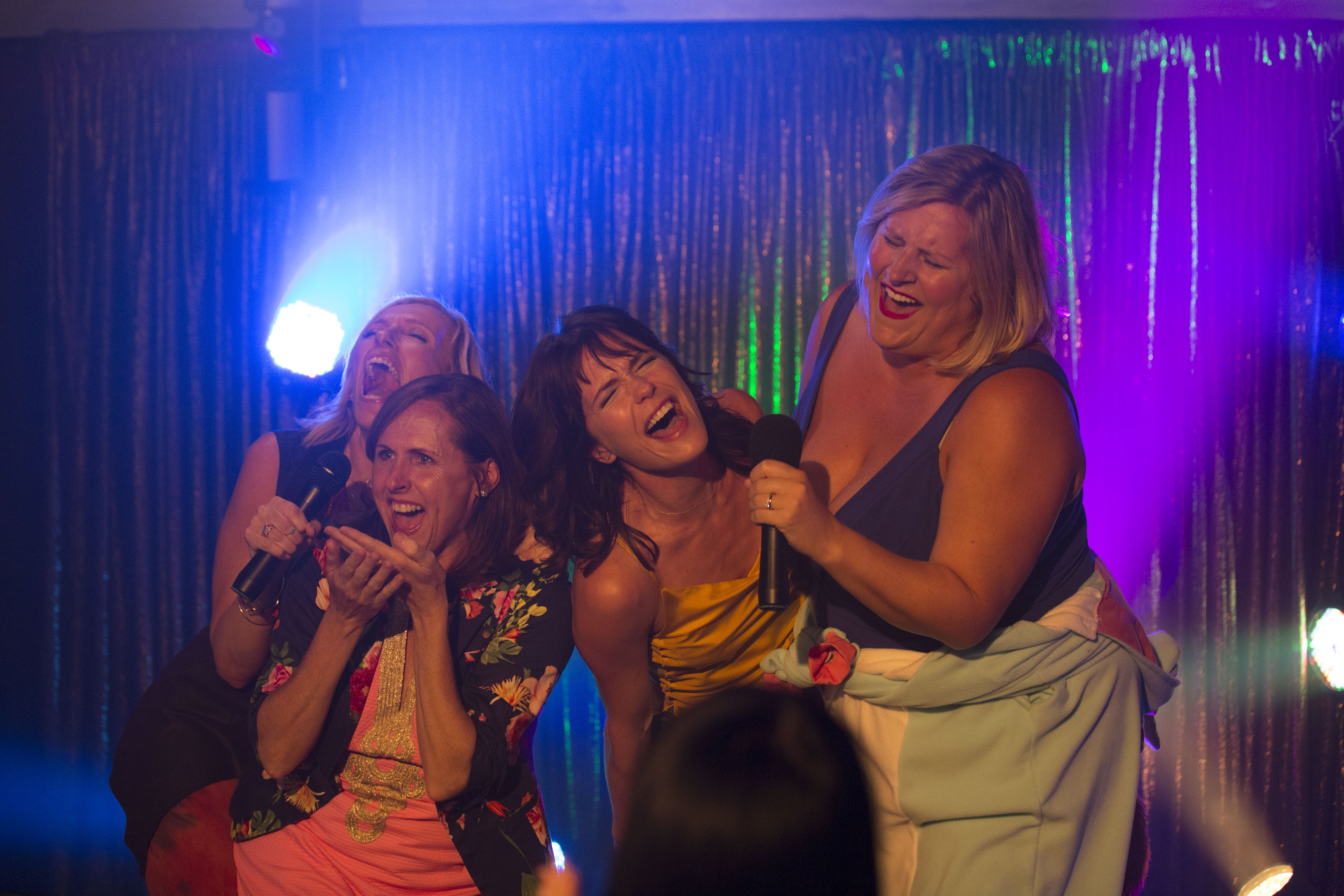
CM: With going three-for-three at Sundance, was negotiating deals at Sundance as much of a whirlwind as I’ve heard? You’ve done it three times now.
NS: I know, it’s like a second home. I feel like we were so lucky to be there three years in a row, and I think they are three very different kinds of films with three different kinds of distribution paths we took. Adam and I are very grateful that we were able to do this and able to find homes for, again, three very different stories.
CM: Are you getting a sense of the various distribution chains now? You’ve seen the VOD route, you’ve seen the theatrical releases. Are you getting a better sense in terms of negotiating deals for future films of how to navigate that landscape?
NS: It does seem a little easier, I will say. Year one, we were in a hotel room up ‘til three A.M. talking and meeting with distributors and having these frantic last-minute phone calls. And then cut to this year where we sold the film before we went to the festival. Just before. So there is a bit of a difference, and I don’t know if that just comes with a little bit of experience, or if there are distributors who are getting to filmmakers before festivals. That said, there are still so many sales and big sales – like The Big Sick – that happen at the festival, that the more traditional festival sales route is still very much in place. But there’s just more opportunity for these films, and frankly, we need it. We need as many options as we can. They’re not easy films to make but on top of it, they’re even harder to sell.
CM: What are you working on next?
NS: We’re in development with a couple things, specifically for Adam. He’s directed television, so we’re looking to figure out the next thing for him to star and direct in on the feature side. And we are producing – strangely, we’ve taken a big left-turn – and we have a network show coming out this fall on Fox called Ghosted.
CM: Is this your first time since the Jimmy Kimmel days of dealing with a network?
NS: A hundred percent, and things have changed in ten years [laughs]. For the better! Fox has been great, and creatively is letting us do what we want to do, which is create a scary comedy. So that’s our goal with that. It feels like a bit of coming full circle on that front. But I’m definitely looking forward to our hiatus when we can do another indie, which is our favorite thing to do.
CM: So keeping intimate sets and smaller budgets, that’s the continued plan on the features side?
NS: A hundred percent. And having that creative control, which is really important. Finding stories that are currently still out there and haven’t been told yet.
__
Thanks so much to Noami for the great chat about FUN MOM DINNER. Learn more about the film at the official website or on Twitter, Facebook, or Instagram.
If you’re an independent filmmaker or know of an independent film-related topic we should write about, email blogadmin@sagindie.org for consideration.

